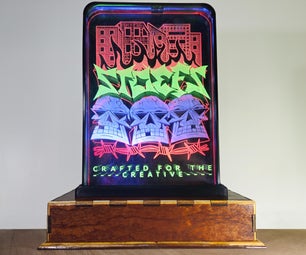Introduction: How to Embed LED Strip Lights in Resin
In this Instructable, I show you how to embed LED strip lights in Epoxy Resin. Additionally, learn how to solder LED lights to a 9v battery and install an on/off switch.
This is my favorite technique for embedding light strips in epoxy tables. It makes it easy to remove/replace the LEDs in the future and it adds a cool accessory to any type of epoxy furniture.
Keep in mind, I use the term 'embed' in this tutorial as a synonym for submerge, cover, and/or encase.
There are several things which are difficult to fully explain with words and images, so be sure to check out the video tutorial above.
Supplies
The tools and material I used for this project are listed below.
Step 1: Hollow Tunnel
First, I am demonstrating this technique on an epoxy wood river table with purple glow powder and embedded Mardi Gras beads. This could be used as an end table or wall art.
In previous projects, I glued LED light strips to the bottom of epoxy or fully submerged them in resin. Obviously, this isn’t ideal because the LED light strip need to be replaced eventually.
As a result, I thought of a way to create a hollow tunnel in epoxy resin large enough to hold a LED light strip.
Step 2: Prepare Tubing and Rod
To create the hollow tunnel, I used 1/4″ clear flexible tubing with a plastic rod.
The tubing does not stay straight and the weight of the epoxy will flatten the tube, so I used a plastic rod. The plastic rod was part of a wall fish kit I received. In turn, I recommend to use something rigid to keep it straight. Also, be sure whatever you use is plastic or rubber because it will need to be cut in later step.
First, I cut a piece of clear tubing and rod the same length as the table. I plan to trim the table ends in a later step, so the tubing/rod will be revealed after this cut.
Next, I inserted the rod in the tubing.
Step 3: Seal Ends
I used hot glue to seal each end in order to prevent resin from leaking into the tube. Silicone works as well, but it doesn't cure as quickly as hot glue.
Step 4: Place Tube in Epoxy
I recommend pouring a thin layer of resin, allowing it to cure, and then placing the tube on top. Then, pour additional layers on top to fully suspend the epoxy resin.. Don't install the tube with the first pour of resin as I did in this project. I wasn't paying attention to what I was doing and installed
Step 5: Pour Epoxy
This step is self explanatory. Ultimately, I just poured resin into the space. Just make sure the tube is fully submerged.
Step 6: Cut Ends
use a circular saw, jig saw, or hand saw to trim each end. Be sure to cut a little of the plastic rod off during the cut. This exposes the rod, which makes it easier to remove.
Step 7: Remove Rod
I exposed the rod from the other side by pushing it a little with a screw driver. Then, I completely remove the rod from the tube.
I inspected the tunnel once I removed the rod. It should look like the picture in this step without any low spots.
Step 8: Install LED Light Strip
First, I taped the led light strip to the rod or device used to keep the tube straight.
Next, I pulled the LED strip through the tunnel.
I cut the LED strips between the contacts. Also, be sure to leave about 5" in excess to power the LED lights.
If your LED light strip plugs into a wall outlet, you can skip the next few steps. Although mine plugged into a wall outlet, I chose to power it via a 9v battery.
Step 9: Install 9v Battery
On the underside of the table, I used my chisels to carve a hole the same size as a 9v battery. I attached 9v battery clip connectors to the battery.
Step 10: Solder LED Lights
I soldered 2 wires to the connectors on the LED light strip.
Step 11: Install On/Off Switch
I cut out a notch in the end of the table to install the on/off switch and used hot glue to secure it in place.
Step 12: Solder Wires Together
I soldered the wires from the battery, LED light strip, and on/off switch together and used heat shrinks to protect it.
Step 13: Conclusion
I hope this instructable provided you with value. Please feel free to leave a comment if you have any questions - I'm happy to help.
Be sure to checkout my YouTube channel and my website for more DIY tutorials.

Participated in the
Anything Goes Contest













